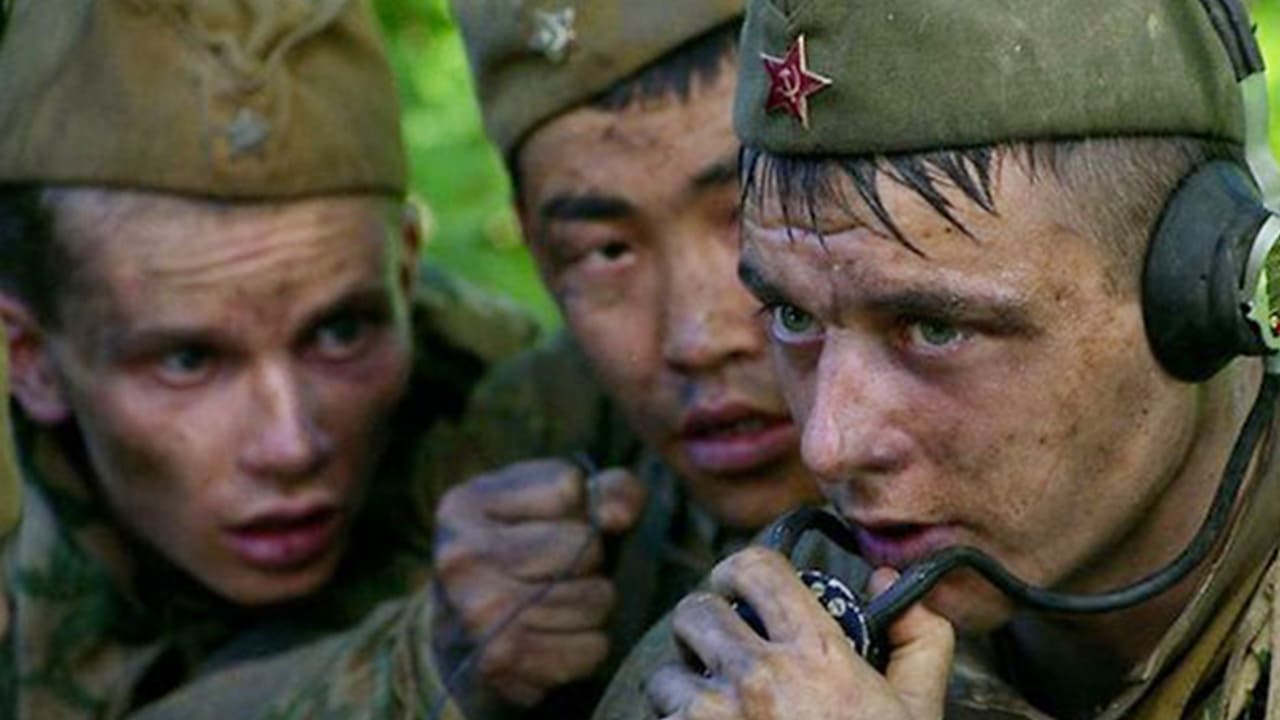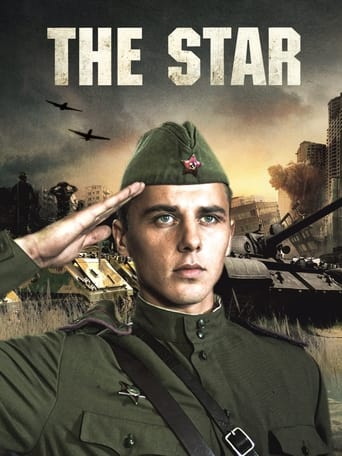

Charming and brutal
... View MoreBoring, long, and too preachy.
... View MoreAmazing worth wacthing. So good. Biased but well made with many good points.
... View MoreIt is an exhilarating, distressing, funny and profound film, with one of the more memorable film scores in years,
... View MoreThe last couple of months have been great when going shopping as I have re-discovered Russian cinema. Especially war films! The first Russian war film, I ever saw, was "Come & See". Perhaps the most outstanding war film of the last 30 years. However, the Russians have re-emerged with numerous war offerings, from Fortress of War, to The Bomber. The former being absolutely stunning!!! The Star however, was a film certainly made in the same vein. The realism and the style of the film was direct. The stealth, guile and intelligence of Soviet soldiers behind enemy lines was thorough and admirable. By 1944 the Red Army was perhaps the most battle-hardened and skillful soldiers in existence. Night manoeuvres and fighting was by that time a master-class in Red Army operations. All I can say, is that it seems that the Russian film industry is returning to this genre, without the communist baggage. All one can hope, is that the Russian film industry keeps making these types of movies.
... View MoreI would say Zvezda is well worth seeing for its sociological value. In short, i see it as the kind of incredibly primitive patriotic propaganda deemed necessary to restore the faith of the population in Putin's tattered Russia by flattering the century-old Russian soft spot for militarism.Besides, Lebedev openly and shamelessly copies Spielberg's "saving private Ryan". The rip-off become obvious when you compare the characters with the original short story (which was awarded the Stalin prize in 1947 !). You will see the German-speaking-greenhorn spring right from Spielberg's script. Same goes for the gross simplifications of the military context. As Spielberg replaces German garrison troops armed with 1940 obsolete French light tanks with first-line veterans supported by Tiger tanks, Lebedev makes up grotesque figures - 10 000 men to chase a handful of Russian scouts ! - and turns what the short story describes as a limited counter-offensive into the threat of an Eastern front version of the battle of the Bulge. This rewriting of history simply stinks.On the same line, one can recognize a scene that borrows heavily from various elements of Sam Peckinpah's "cross of iron" in the middle of the movie. One can also notice the addition of the utterly idiotic final scene (a nearly perfect copy of the equally unrealistic private Ryan finale), where Russian cowboys slaughter stormtroopers (more star wars than Waffen SS style) by the dozen, where the aforementioned greenhorn uses his last breath to lecture the hero about switching a radio transmitter, where the good savage from the steppes, unhindered by a couple of rifle caliber bullets in the arm, continues picking off enemies 100 m away with his PPS 42 submachine-gun, the idiot Germans camp 50m from a barn they could have reduced to matchsticks from a safe distance with mortar, canon or machine-gun fire, etc.The short story was also mainly a bunch of patriotic ranting, but at least the author had seen actual fighting and did not depict such stupid scenes (in the short story the scouts simply throw a couple of grenades at the handful of soldiers probing the barn and escape before the Germans can bring in reinforcement). It also contained some indications about the terrible pressure inside the Red Army during the Stalin era, the very limited support of the "liberated" populations of Bielorussia, and the savage behavior of soldiers of both camps. All this has been utterly wiped out from the movie, leaving only cardboard heroes fighting a kind of generic enemy.By the way, I can't see how anyone could have appreciated the infamous performances of lieutenant Travkin and private Simakova. A fine example of over-the-top and contrived acting from these two main protagonists. Admitedly some secondary characters were not bad, within the limited bounds of their simplistic lines.These kind of fictions that revel in both cheap and fake poetry of war (the reason why the only female character casts languid looks at the starry sky is unfortunately kind of lost in translation : speaking on the radio she can hear the hero say "ia zvezda" which can mean both "star speaking" and "I am a star") are just a step toward the building of another generation of canon fodder. Considering what is currently happening in Chechnya, that movie really gives me the creeps.Have a look at "vremia sobirat' kamni" (the time to pick up stones (instead of throwing them)) instead. A much more interesting point of view on the sequels of WWII in Russia, that shows there is still room in Russia for directors wanting to go a bit farther than primary xenophobia and stupid, blind nationalism.
... View MoreWhat struck me about this film was how Very Russian it was. Having spent some time in the country, enough to get a sense of how Russians like to view themselves, this films themes felt very familiar. The depiction of the female radio operator, was so cliche, and well almost laughable. The band of scouts seemed to scream hey look we're PC, we even have a central Asian guy. The group also largely reminded me of the gang from Saving Private Ryan. There was even the weedyl little guy who is too afraid to shoot. All this said, its not a BAD film, its quite enjoyable, and its always interesting to see a WW2 film that is not from the Allied side. Alas though it falls short of greatness, well short due its insistence on dragging out all the old WW2 films tricks. You have seen this all before, the film offers nothing new. The thing that always irked me about Private Ryan, was the overtly sanctimonious/God Bless America style ending. The Star has an equally patriotic finale, but somehow the Russian patriotism is less galling. Overall a solid film, good even, but its been done.
... View MoreHi!Zvezda got two golden eagle (zolotoi oryol) prize for best cinematography and best music for Russian movies of 2002.Theme music by guitar solo or strings orchestra portrays romantic love feeling of Katya, a young female soldier in front head quarter communication unit who loves "Zvezda" scout team leader lieutenant Trabkin.Beside this is a serious and precise war combat story, this is romantic love story with lovely music.
... View More